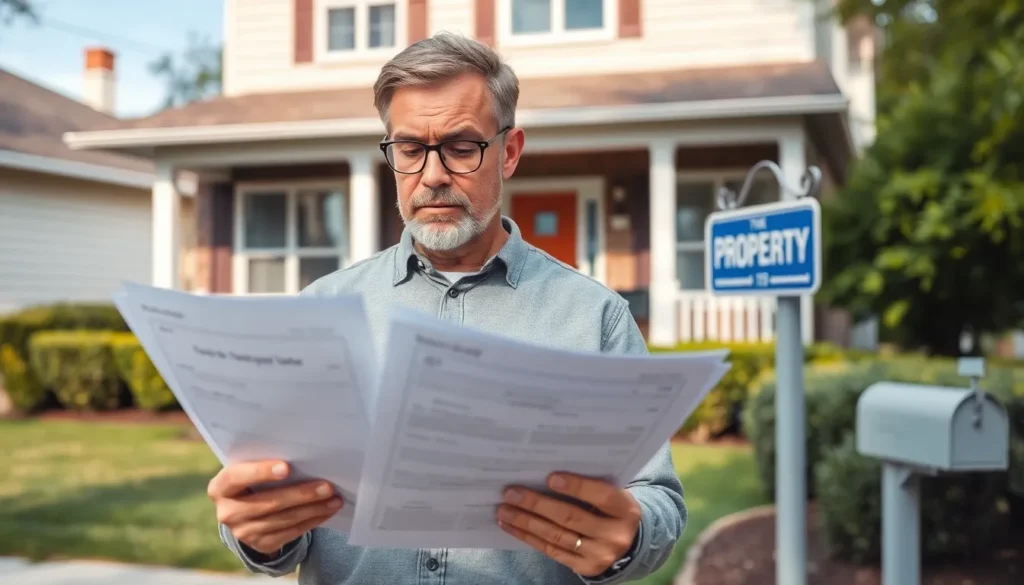Table of Contents
ToggleProperty taxes can feel like that one uninvited guest who overstays their welcome. Just when you think you’ve settled in, they pop up again, demanding more of your hard-earned cash. If you’re tired of watching your money slip away into the abyss of property tax assessments, you’re not alone. Many homeowners are on a quest to uncover the secrets to reducing those pesky assessments without losing their sanity—or their sense of humor.
Understanding Property Tax Assessments
Homeowners often seek clarity on property tax assessments. Each assessment determines the tax amount based on property value.
What Is a Property Tax Assessment?
A property tax assessment is the process by which municipal authorities evaluate a property’s value for taxation purposes. This value hinges on various factors, including the condition, size, location, and market trends. Municipal assessors utilize this value to calculate property taxes owed by owners.
Factors Affecting Property Tax Assessments
Several factors influence property tax assessments. Location plays a significant role, as properties in desirable areas often carry higher values. Property size and improvements, such as renovations or additional structures, also contribute to value changes. Local market conditions affect assessments too; a booming market may increase property values. Lastly, comparable property sales data provides assessors with insights for determining accurate valuations.
Strategies to Reduce Property Tax Assessment
Homeowners can implement several strategies to effectively reduce property tax assessments.
Researching Your Property’s Value
Start by gathering information on your property’s estimated value. Utilize online property databases to compare recent sales of similar homes in the area. Access municipal records to understand the assessments of properties nearby. Additionally, consider examining the condition of your property versus those of comparables. Identify discrepancies that may affect the assessment negatively. Accurate data supports a clear understanding of your property’s market position.
Challenging the Assessment
Understand the process of disputing an inaccurate assessment. Prepare necessary documentation, such as comparable sales data and property tax records. File an appeal with the local tax assessor’s office if discrepancies exist. Present evidence that supports the claim for a lower valuation. Some homeowners successfully enlist the help of a property tax consultant to navigate the appeal process. Keep track of deadlines for filing to ensure a timely challenge. Make sure to follow up on the status of your appeal for accountability.
Tips for Homeowners
Homeowners can take proactive steps to reduce property tax assessments. Specific strategies help identify inaccuracies and bolster appeal processes.
Identifying Errors in Your Assessment
Start by reviewing the property assessment notice for any inaccuracies. Homeowners should compare property details with recent sales of similar homes to identify inflated values. Assessing the condition of the home relative to those comparables often reveals discrepancies. Check for outdated information, such as incorrect square footage or unaccounted updates. Noticing any errors can lead to a more accurate assessment and potential savings.
Preparing for an Appeal Hearing
Gathering documentation is crucial before an appeal hearing. Homeowners must compile evidence such as photographs, repair receipts, and inspection reports. Presenting comparable sales data strengthens the argument against an inflated assessment. Practicing a clear, concise presentation of findings and anticipated questions also helps during the hearing. Arriving prepared and organized often leads to better outcomes in the appeal process.
Working with Professionals
Homeowners can benefit significantly from professional assistance when navigating property tax assessments. Utilizing expert knowledge ensures more accurate and effective outcomes.
Hiring a Property Tax Consultant
Engaging a property tax consultant brings specialized expertise to the assessment process. These consultants analyze property details, assess recent sales data, and identify potential errors in assessments. They understand local tax laws and can provide a strategic approach to filing appeals. A well-prepared consultant gathers necessary documentation and presents cases effectively at hearings. Their insights can lead to lower assessments and significant savings.
Engaging an Attorney
Hiring an attorney specializing in property tax law offers another avenue for contesting assessments. Such professionals can handle complex legal aspects regarding property tax disputes. An experienced attorney evaluates the merits of a case and prepares for potential litigation if necessary. They provide guidance on the appeal process and can represent homeowners during hearings. Their legal expertise ensures compliance with all relevant statutes and enhances the chances of a favorable outcome.
Conclusion
Homeowners can take proactive steps to reduce property tax assessments and alleviate financial burdens. By carefully researching property values and identifying discrepancies, they can challenge inflated assessments effectively. Utilizing the expertise of property tax consultants or attorneys can further enhance their chances of success during the appeal process.
Staying informed about local market trends and maintaining accurate property records is essential for navigating tax assessments. With the right approach and resources, homeowners can achieve more manageable property tax obligations while ensuring their rights are protected. Taking action today can lead to significant savings tomorrow.







